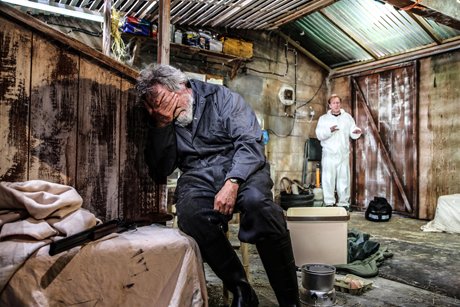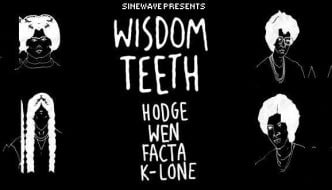Review: And Then Come The Nightjars at the Bristol Old Vic
November 9, 2015

Photo Credit: Bristol Old Vic
Winner of the Theatre 503 Playwriting Award, 2014, And Then Come The Nightjars is an equally heart-warming and -wrenching play with a sparkling cast of two. Set in South Devon during the 2001 foot and mouth epidemic, the narrative focuses on the relationship between a widowed farmer, Michael, and local vet, Jeff.
The stage is beautifully decked out as Michael’s cowshed, on a small stage at the Bristol Old Vic. The shed is intimate and cosy, and, encouraged by the warmth of the aging farmer, the audience is immediately invited into this personal space. As the days, and seasons, and years roll by, rain hammers upon the roof, sun shines from above and fireworks explode offstage. Both visual and auditory production on the piece are astoundingly successful; I am presently surprised that so much can be evoked in such limited space.
As the distant sounds of Michael’s cows – his “girls” – eventually cease, the empty stalls become unbearable. I want to climb on stage and comfort the characters, as I watch them descend into the depths of their different sadnesses.
David Fielder, who plays the role of Michael, is instantly captivating. He emanates a delightful mixture of irritability, playfulness, anger, sorrow, and good humour that is infectious. There were moments when I laughed with him, and at him, when my mouth hurt from grinning, there were moments when I felt like my heart might break for him. In that short time, I had an incredible insight into a character that felt just as real as the talented actor playing him.
[pullquote align=”right” cite=”” link=”” color=”” class=”” size=””]”You hardly ever see ’em, only hear them. They fly silent. It’s bad luck is Nightjars. It’s a bird o’death.”[/pullquote]
Although we never leave the cowshed, the events of Jeff’s life are communicated to the audience in a way that never feels strenuous. His is a less instantly likeable character – he is the harbinger of doom, and it is difficult to disassociate him from the men outside. They, the government’s henchmen, are the real villain of the play, rather than foot and mouth disease itself. With time, however, even Jeff is humanised through his own personal hardships and I am happy when I readily differentiate between him and the faceless men that lurk out of sight.
The conflict and union between Michael and Jeff was a delight to watch; their unlikely pairing was the ferocious success of the play. Spanning ten years, their friendship blossoms into a father-son relationship that is both comforting, and amusing, considering their tumultuous beginnings. As Michael’s health deteriorates toward the end of the play, the worry in Jeff’s eyes is visible from my seat. Their emotions are so well demonstrated throughout the performance that I still find it hard to believe that they are not real people.
Unfortunately, its short run at The Old Vic has ended, but if you ever get the chance to see this play, I highly recommend it. It was fascinating to see this already forgotten event humanised. I must admit that I had never truly considered the devastating effects that foot and mouth had, other than for the cows themselves before. I am certain that the lasting impression that And Then Come The Nightjars had on me is due in part to the reality of its subject matter, and in part to the realism with which the story was shared.
Whilst waiting for its return, you can watch the trailer below. You can also read the play, which is published under the same title, by award-winning playwright Bea Roberts.
Follow Hannah Emadian at aseparateworld.tumblr.com.




Comments